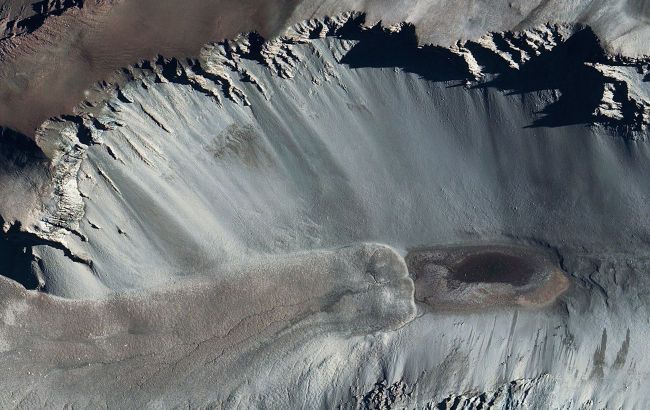Saltiest lake on Earth: Unfreezing even at -50 degrees
 The unique saltiest lake on the planet (photo: lance.modaps.eosdis/nasa.gov)
The unique saltiest lake on the planet (photo: lance.modaps.eosdis/nasa.gov)
Amid the harsh conditions of the Antarctic McMurdo Dry Valleys lies a true natural wonder. Lake Don Juan amazes with its unique salinity, which prevents the water from freezing even at extremely low temperatures.
Read in the material by RBC-Ukraine what is known about this body of water, what properties its water possesses, and what scientists think about the lake.
Lake Don Juan, located in the McMurdo Dry Valleys, is Earth's saltiest natural body of water.
This lake is small, and from afar, it could be mistaken for a large puddle, as it covers an area of only 0.03 square kilometers. However, due to its unique properties, it has captivated scientists worldwide for several decades.
What makes this lake unique and the only one of its kind on Earth is that its water has a salt concentration exceeding 40%. This makes it 12 times saltier than ordinary seawater and nearly twice as salty as the Dead Sea.
Thanks to this extraordinary property, the water in Don Juan does not freeze even at temperatures as low as -50 degrees.
Researchers from Brown University have discovered that the primary source of the lake's salinity is not groundwater, as previously thought, but moisture absorbed by salts from the air. Salt-saturated water seeps into the ground and accumulates as a small body of water.
The McMurdo Dry Valleys, where the lake is located, are considered one of the harshest places on the planet. There is virtually no precipitation, and the environment is so extreme that it resembles conditions on Mars.
For this reason, Don Juan has become a key object of study for astrobiologists. Its physical characteristics allow scientists to model potential water systems on other planets, particularly on the Red Planet.
By the way, one of the mysteries of this lake is its origin. Another is how microscopic life forms can survive in such salty water.
Interesting facts about lake:
- The lake was named after pilots Don Roe and John Hickey, who first discovered it in 1961.
- A high concentration of calcium chloride instead of the usual sodium chloride makes the water's chemical composition unique.
- The conditions at Don Juan resemble those that might exist on Mars, making research on this lake crucial for understanding extraterrestrial life.
- The salt content of Don Juan is 40%; for comparison, the Great Salt Lake has 5–27%, and the Dead Sea has 34%.
Earlier, we wrote about how scientists uncovered the secrets of another unique Antarctic lake.
Read also about five Antarctic discoveries that amazed scientists the most.

